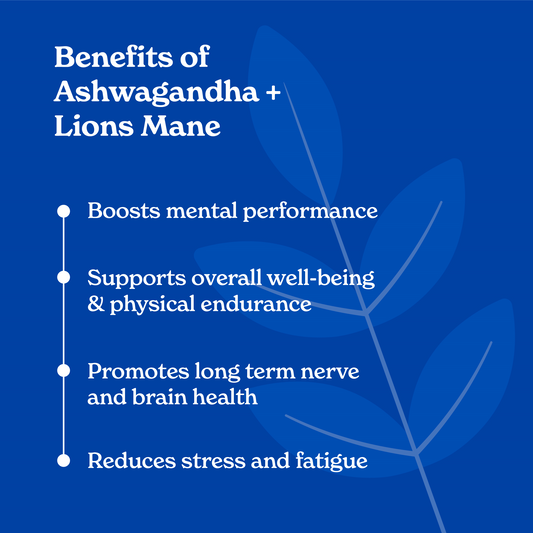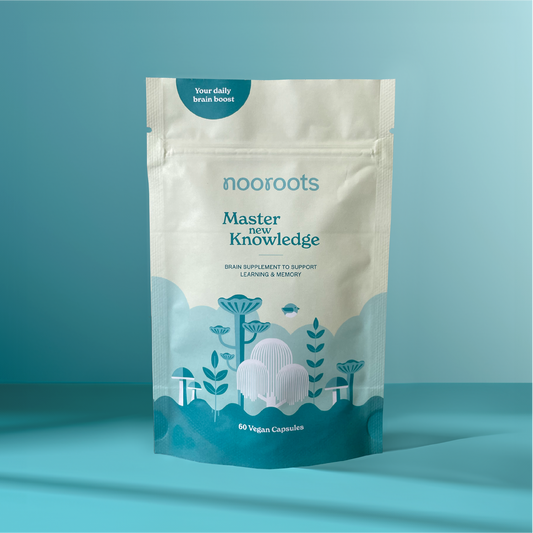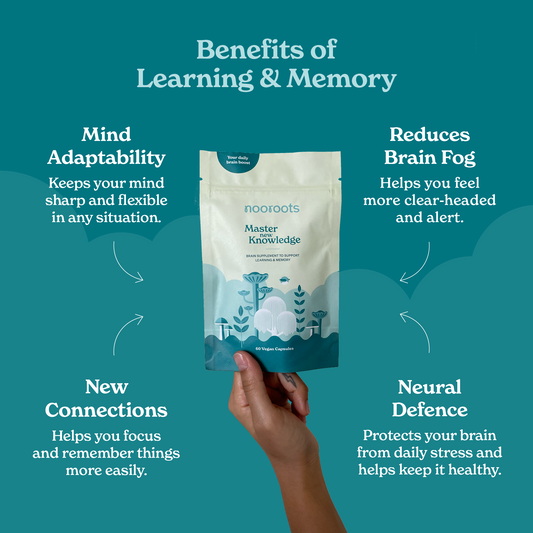Nootropics—commonly known as “smart drugs” or cognitive enhancers—are compounds that support and optimize brain function, influencing processes such as memory, focus, learning, and mental clarity.
In recent years, the pursuit of enhanced cognitive performance has extended beyond synthetic substances to natural nootropics: plant-derived, amino acid–based, or nutrient-based compounds that aim to improve mental performance with a lower risk of side effects. This growing interest reflects a broader shift toward holistic approaches to cognitive health, integrating brain optimization with overall physical and emotional well-being.
Among the many factors that influence cognition, sleep stands out as one of the most essential yet undervalued. High-quality sleep is fundamental to memory consolidation, emotional regulation, and neuroplasticity—the brain’s ability to form new connections. Chronic sleep deprivation, on the other hand, impairs cognitive performance, increases stress reactivity, and disrupts metabolic and immune functions.
Given the widespread prevalence of sleep issues, many individuals are turning to natural nootropics that support both mental clarity and restorative sleep. These compounds work through diverse mechanisms—such as modulating neurotransmitters like GABA and serotonin, reducing cortisol levels, or promoting relaxation through adaptogenic pathways.
This blog explores several natural nootropics shown to enhance sleep quality while supporting cognitive balance, offering an integrated approach to mental performance and restorative rest.
Table of Contents
- Understanding Sleep and Natural Nootropics
- Top Natural Nootropics for Sleep
- How to Incorporate Natural Nootropics into Your Routine
The Best Natural Nootropics to Improve Sleep Quality

Understanding Sleep and Natural Nootropics
Defining Sleep and Its Importance
Sleep is a fundamental biological process essential for human survival, cognitive performance, and emotional stability. It is far from a passive state—it involves intricate interactions among neural circuits, hormones, and metabolic systems that allow the brain and body to restore, repair, and recalibrate.
Sleep is broadly divided into two main phases: non-rapid eye movement (NREM) sleep and rapid eye movement (REM) sleep. NREM sleep includes three stages that progress from light sleep (Stage 1) to deep, slow-wave sleep (Stage 3), which is critical for physical recovery and cellular repair. REM sleep, characterized by vivid dreaming and rapid eye movements, supports emotional regulation, learning, and memory consolidation (Walker & Stickgold, 2006).
Disruptions to either NREM or REM sleep can impair concentration, mood regulation, and metabolic health. Chronic sleep deprivation is linked to a higher risk of cardiovascular disease, insulin resistance, and neurodegenerative disorders (Medic et al., 2017). Thus, maintaining both the quality and consistency of sleep is integral to cognitive and physiological resilience.
The Role of Neurotransmitters in Regulating Sleep
The sleep–wake cycle is governed by a complex interplay of neurotransmitters that promote either arousal or restfulness.
- Gamma-aminobutyric acid (GABA) is the brain’s principal inhibitory neurotransmitter. It reduces neuronal excitability and promotes relaxation, facilitating the onset and maintenance of sleep. Many natural sleep-promoting nootropics—such as valerian root and magnolia bark—act by enhancing GABAergic signaling.
- Acetylcholine, norepinephrine, dopamine, and serotonin contribute to alertness, mood regulation, and circadian rhythm alignment. Balanced interactions among these systems ensure smooth transitions between sleep stages and sustained wakefulness during the day.
Disruptions to these neurochemical systems—through stress, caffeine overuse, or circadian misalignment—can impair both sleep quality and cognitive performance. Natural nootropics that gently modulate these pathways may therefore play a dual role in enhancing sleep and supporting daytime cognition, helping to restore a healthy neurochemical equilibrium.
Top Natural Nootropics for Sleep
Melatonin:
- Origin and Traditional Use: Melatonin is a hormone naturally produced by the pineal gland in the brain, primarily released in response to darkness. It helps regulate the sleep-wake cycle by signaling the body to prepare for sleep. Melatonin levels rise in the evening, promoting drowsiness, and fall in the morning, helping to wake the body.
- Mechanism: Melatonin supplements mimic the effects of the natural hormone, effectively helping to adjust the body's internal clock. This can be particularly beneficial for individuals experiencing jet lag, shift work, or insomnia. By aligning the body's circadian rhythms, melatonin can significantly improve sleep onset and quality .
- Benefits: Research shows that melatonin supplementation can enhance sleep quality, reduce sleep onset latency, and improve overall sleep efficiency without significant side effects. It is especially useful for those with circadian rhythm disorders.
L-Theanine:
- Common Sources: L-Theanine is an amino acid commonly found in green tea leaves. It has been a part of traditional tea consumption for its calming effects without causing drowsiness.
- Mechanism: L-Theanine promotes relaxation by increasing levels of GABA, a neurotransmitter that inhibits neuronal activity, thus reducing stress and promoting a state of calm. This process helps improve sleep quality by making it easier to fall asleep and reducing disturbances during the night.
- Benefits: Studies have demonstrated that L-Theanine improves sleep quality, particularly in populations with anxiety or ADHD. It reduces sleep latency (the time it takes to fall asleep) and minimizes nighttime awakenings, contributing to a more restful sleep without the sedative effects of traditional sleep aids.
Valerian Root:
- Background and Historical Use: Valerian root has been used for thousands of years as a natural remedy for insomnia and anxiety. It is known for its sedative properties and is often used in herbal medicine to promote relaxation and sleep.
- Mechanism: Valerian root works by enhancing the activity of GABA receptors in the brain, which helps to induce calmness and facilitate sleep. This interaction makes it an effective natural treatment for improving sleep quality and reducing the time needed to fall asleep.
- Benefits: Clinical studies have shown that valerian root can improve overall sleep quality, decrease the time it takes to fall asleep, and help maintain sleep throughout the night, making it a reliable natural option for those struggling with sleep disorders.
Magnesium:
- Origin and Traditional Use: Magnesium is an essential mineral involved in over 300 biochemical reactions in the body, including muscle and nerve function, protein synthesis, and blood glucose control. It also plays a crucial role in maintaining healthy sleep patterns.
- Mechanism: Magnesium helps regulate neurotransmitters and hormones that are critical for sleep. It supports deep, restorative sleep by maintaining healthy levels of GABA, which promotes relaxation and can reduce symptoms of insomnia .
- Benefits: Supplementation with magnesium has been shown to improve sleep quality, especially in older adults. Studies have found that magnesium can increase sleep time, improve sleep efficiency, and reduce the time it takes to fall asleep.
Passionflower:
- Origin and Traditional Use: Traditionally used as a herbal treatment for anxiety and insomnia, passionflower has a long history of use in various cultures for its calming effects and ability to promote sleep.
- Mechanism: Passionflower works by increasing levels of GABA in the brain, which helps reduce anxiety and improve the quality of sleep. Its sedative properties make it a valuable natural remedy for those suffering from insomnia and other sleep disorders.
- Benefits: Research indicates that passionflower can significantly improve sleep quality, reduce nighttime awakenings, and help manage sleep irregularities. It is particularly effective in improving subjective sleep quality in those with mild sleep disturbances.
Ashwagandha:
- Origin and Traditional Use: Ashwagandha, a cornerstone of Ayurvedic medicine, has been used for over 3,000 years to relieve stress, increase energy levels, and improve concentration. It is renowned for its adaptogenic properties, helping the body manage stress.
- Mechanism: As an adaptogen, Ashwagandha helps modulate the balance of neurotransmitters and stress hormones like cortisol. By reducing physiological stress responses, it indirectly supports better sleep quality and duration.
- Benefits: Clinical studies have shown that Ashwagandha significantly improves sleep quality and reduces symptoms of anxiety and stress, which are common barriers to restful sleep. Its calming effects on the nervous system facilitate the onset of sleep and enhance overall sleep duration.
Kava:
- Origin and Traditional Use: Kava, derived from the roots of the kava plant, has been traditionally consumed in the South Pacific for its relaxing and sedative effects. It is used to promote relaxation, reduce anxiety, and improve sleep.
- Mechanism: Kava contains kavalactones, which affect the brain and other parts of the central nervous system, promoting calmness and reducing anxiety without impacting REM sleep. This makes kava an effective natural remedy for improving sleep quality.
- Benefits: Clinical trials have demonstrated that kava can reduce anxiety and improve sleep quality, making it a promising alternative to pharmaceutical anxiolytics for individuals seeking natural sleep aids.
Tryptophan:
- Common Sources: Tryptophan is an essential amino acid found in various protein-based foods and supplements. It serves as a precursor to serotonin, a neurotransmitter that can be converted to melatonin, which is vital for regulating sleep.
- Mechanism: By boosting serotonin levels, tryptophan can help stabilize mood and promote the natural production of melatonin, thereby supporting a healthy sleep cycle and improving sleep quality .
- Benefits: Research has shown that tryptophan supplementation can reduce the time it takes to fall asleep and improve overall sleep quality, particularly when taken in doses over 1 gram .
Chamomile:
- Origin and Traditional Use: Chamomile has been used for centuries as a natural remedy for various ailments, including sleep disorders. Commonly consumed as a tea, it is renowned for its mild sedative and relaxing properties.
- Mechanism: Chamomile contains apigenin, an antioxidant that binds to certain receptors in the brain that promote sleepiness and reduce insomnia. Its gentle sedative effects make it a popular choice for those seeking to improve sleep quality naturally.
- Benefits: Studies have shown that chamomile can improve overall sleep quality and is particularly effective in individuals with mild to moderate generalized anxiety disorder. Its calming effects help ease the transition to sleep and enhance sleep duration.
How to Incorporate Natural Nootropics into Your Routine
Tips for Selecting High-Quality Supplements
When selecting natural nootropic supplements, choose reputable brands that provide full transparency about ingredient sourcing, dosages, and clinical evidence. Opt for standardized extracts and bioavailable nutrient forms, and verify that each product has undergone independent third-party testing for purity and potency. Look for certifications such as GMP, NSF, or ISO to ensure manufacturing quality, and avoid proprietary blends or unnecessary additives. Reputable brands should publish Certificates of Analysis (COAs) and comply with relevant regulatory standards to guarantee safety, efficacy, and integrity.
Recommended Dosages and Timing for Optimal Sleep Benefits
Dosage guidelines are not universal; they depend on the type of nootropic and individual responsiveness. For example:
- Melatonin: 1 to 6 mg taken 30 minutes to an hour before bedtime is effective for most individuals. Start with a lower dose to assess tolerance and effectiveness.
- L-Theanine: 100-400 mg taken 30-60 minutes before bedtime can promote relaxation and improve sleep quality.
- Valerian Root: 300-600 mg of valerian extract, taken 30 minutes to two hours before bedtime, is commonly used to enhance sleep quality.
- Magnesium: 200-400 mg, ideally taken in the evening, helps support deep, restorative sleep.
- Passionflower: 250-500 mg of passionflower extract taken an hour before bedtime can help reduce anxiety and improve sleep quality.
- Ashwagandha: 250-600 mg daily, preferably taken in the evening, aids in stress reduction and sleep improvement.
- Kava: 70-250 mg of kavalactones taken in the evening can help alleviate anxiety and promote better sleep.
- Tryptophan: 250-425 mg taken 30 minutes before bedtime can support the natural sleep cycle by increasing melatonin production.
- Chamomile: Consuming chamomile tea or 250-1,100 mg of chamomile extract 30 minutes before bed can help induce sleep.
Nighttime administration is preferable, as it coincides with your natural circadian rhythm and helps ease you into sleep.
Advising Consultation with a Healthcare Provider
Before beginning any new supplement regimen, consult a qualified healthcare professional to ensure safety and suitability. This is especially important if you have pre-existing health conditions, are pregnant or breastfeeding, or are taking prescription medications, as certain nootropics may interact with drugs or influence underlying health factors. A healthcare provider can help assess potential contraindications, recommend evidence-based dosages, and tailor supplement use to your individual physiology and cognitive goals.

Conclusion
Integrating natural nootropics into a well-balanced lifestyle can meaningfully support both sleep quality and overall cognitive health. These compounds offer a gentler, evidence-based alternative to conventional pharmaceutical sleep aids, acting through natural neurochemical pathways to promote relaxation, reduce stress, and encourage restorative sleep.
Unlike synthetic sedatives, many natural nootropics work by modulating neurotransmitters such as GABA and serotonin, lowering cortisol levels, or supporting circadian rhythm regulation without impairing next-day alertness. When used thoughtfully, they can complement broader wellness strategies—such as maintaining consistent sleep schedules, optimizing light exposure, and practicing good sleep hygiene—to enhance both nighttime recovery and daytime mental clarity.
For best results, individuals should prioritize clinically studied, high-quality formulations, adhere to appropriate dosages, and seek guidance from healthcare professionals, particularly if combining nootropics with other medications or supplements.
By taking a holistic approach—integrating nutrition, lifestyle habits, and natural cognitive support—it becomes possible to achieve more balanced sleep, improved focus, and greater overall well-being.







